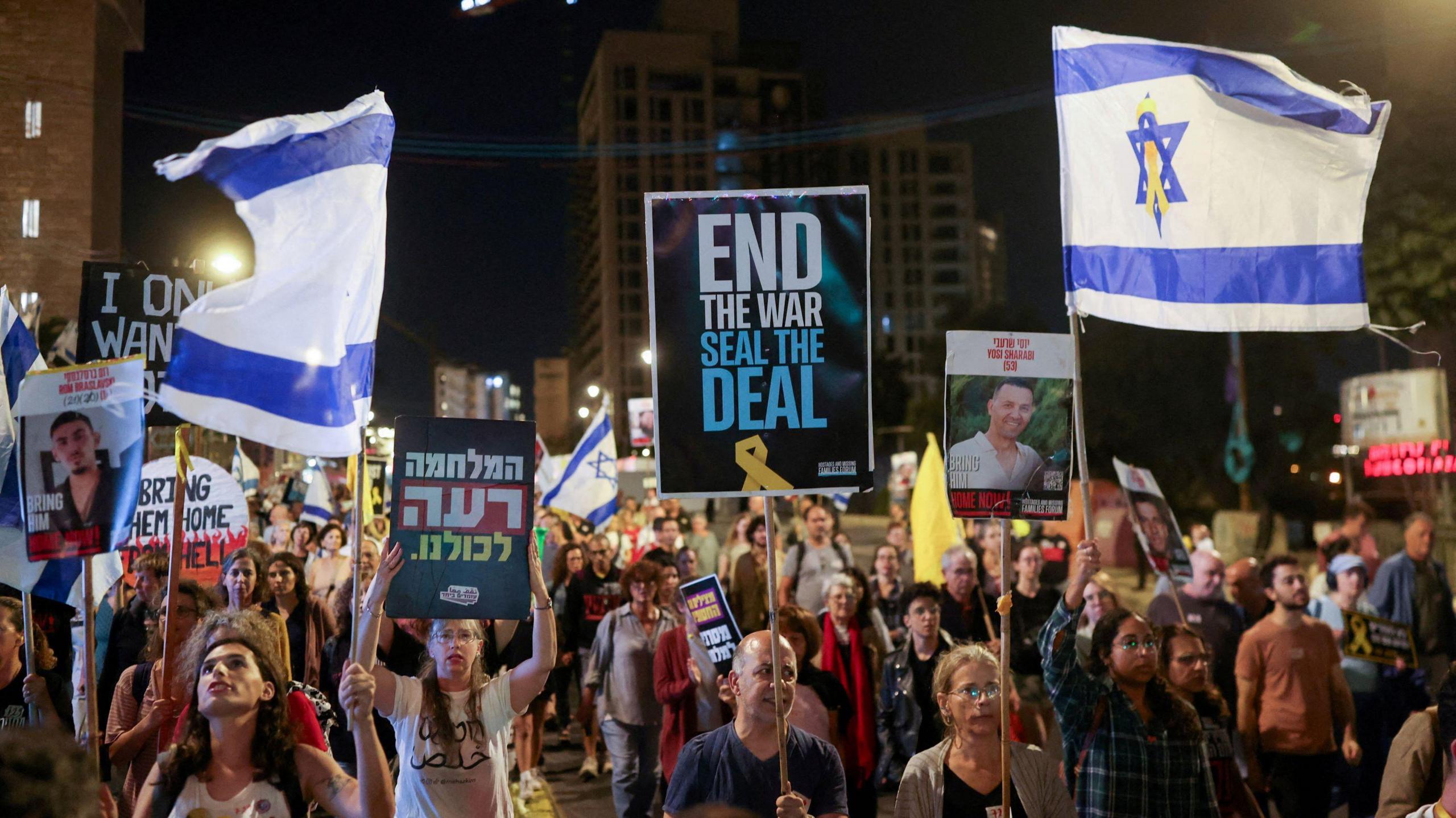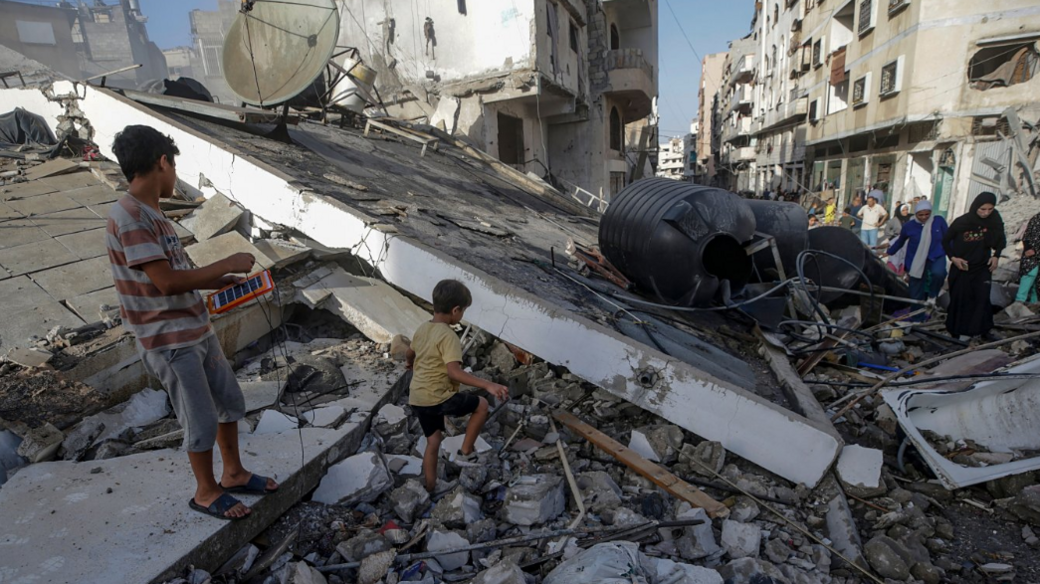Netanyahu says he hopes to announce hostage release in the 'coming days'

- Published
Israeli Prime Minister Benjamin Netanyahu has said he hopes to announce the release of hostages being held in Gaza "in the coming days".
In a televised statement, he also said "Hamas will be disarmed and Gaza will be demilitarised – either the easy way or the hard way, but it will be achieved".
The comments came after Hamas released a statement on Friday in which it agreed to free the hostages under a US peace plan, but did not mention disarmament and sought negotiations on other issues.
Hamas said on Saturday that Israel was continuing to commit "massacres", after strikes hit Gaza in the morning, and it urged global pressure on Israel.
Indirect ceasefire talks between the parties are set to start in Egypt on Monday.
US President Donald Trump said he would "not tolerate delay" from Hamas to complete a deal.
In a post on his Truth Social platform, Trump said: "Hamas must move quickly, or else all bets will be off... Let's get this done, FAST."
He later posted that Israel "has agreed to the initial withdrawal line", seeming to refer to various lines of Israeli troop withdrawal published alongside the US plan.
The 20-point plan proposes an immediate end to fighting and the release of 20 living Israeli hostages held by Hamas - as well as the remains of those thought to be dead - in exchange for hundreds of detained Gazans.
In a post on X the Israel Defense Forces said it had issued an order "to advance readiness for the implementation of the first phase of the Trump plan for the release of the hostages". It added that the safety of IDF troops was "a top priority".
Watch: Hopes and fears in Gaza and Israel over potential ceasefire
Hamas was under pressure to accept at least some points of Trump's plan. And this is exactly what they have done, with a "yes but" response. The group agreed to release all the remaining Israeli hostages, both living and dead, and that Gaza would be governed by technocrats.
But, among other things, the group did not mention whether it would disarm - a key Israeli demand.
In both Gaza and Israel, there has been cautious optimism that the current efforts could finally lead to a deal. One of the main differences now is the personal involvement of Trump, keen to be remembered – and rewarded – as the man who ended the war.
He has publicly urged Hamas to accept a deal, threatening even more military force, and there have been indications of his growing irritation with Israel's leadership recently. But it is unclear if the Trump effect will be enough.
The reality is that the obstacles that prevented earlier deals essentially remain the same, including Hamas' demand for a full Israeli withdrawal and a guarantee that Israel will not resume the war after the hostages are freed. The group knows it will be vulnerable without the hostages and will without doubt demand strong assurances that that will not happen.
There are suspicions elsewhere too. Many, inside and outside Israel, have accused Netanyahu of sabotaging previous efforts to prolong the war for political purposes.
He is supported by ultranationalist ministers who have threated to quit the coalition if the war ends without Hamas' total defeat. That could lead to the collapse of the government. For now, the prime minister seems to be safe.
Domestically, however, polls have consistently suggested that most Israelis favour a deal with Hamas for the release of the hostages and the end of the war. The country remains deeply divided, exhausted by the war and increasingly isolated internationally.
There is huge momentum for a deal, but this is no guarantee that one will be reached.
Families of hostages have told the BBC they have hope their loved ones will be returned soon.
Vicky Cohen, whose son Nimrod is among 20 captives held in Gaza who are still believed to be alive, said she had woken on Saturday with a sense of expectation, but also "fear that something will go wrong".
"It is a fragile situation and we don't want to be disappointed again. And yet I feel hope that soon I will see Nimrod and I can hug [him] again," she said.

Much of Gaza has been reduced to rubble over the past two years
Reactions to the proposals among Palestinians in Gaza have ranged from hope to deep suspicion.
Some fear Hamas has walked into a trap, and that Israel will reclaim its hostages only to resume the war. Others believe a historic opportunity has opened to end two years of conflict.
"Don't get carried away by optimism," Gaza resident Ibrahim Fares told the BBC. "There will be rounds of talks over the details. The devil is always in the detail."
Meanwhile, Israeli military strikes have continued to hit Gaza, despite Trump telling Israel in a message on social media on Friday to "immediately stop the bombing".
Three air strikes hit Gaza City early on Saturday, one of which killed one person and wounded several others, according to medical sources at al-Shifa Hospital.
The Hamas-run health ministry in Gaza said 66 people had been killed by Israeli military operations in Gaza in the past 24 hours, bringing the total since the war began to 67,074.
International journalists have been banned by Israel from entering the Gaza Strip independently since the start of the war nearly two years ago, making verifying claims from both sides difficult.
The Israeli military launched a campaign in Gaza in response to the Hamas-led attack on southern Israel on 7 October 2023, in which about 1,200 people were killed and 251 others were taken hostage.
Most of Gaza's population has been repeatedly displaced and more than 90% of homes are estimated to be damaged or destroyed.